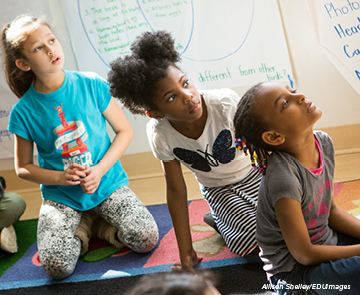Successful Implementation of the First 10 Model: Insights from Rhode Island

Starting in 2021, the Rhode Island Department of Education (RIDE) partnered with First 10 to improve the quality and coordination of the early childhood education and care in three communities: East Providence, Johnston, and Woonsocket. This report evaluates this partnership’s work spanning from spring 2021 through December 2023. Key findings from the evaluation include: All…
School Leader Perspectives on First 10 Partnerships: New Video
First 10 is excited to share the first in a series of short videos to spotlight the work of First 10 partnerships nationwide. In First 10, community agencies, families, Head Start, child care, preK, and schools form partnerships and take action to ensure all children learn and thrive. We’ll be sharing a variety of perspectives…
Hear from First 10 Leaders: Campaign for Grade-Level Reading Webinar on 9/27

We are really excited to have this discussion with a fantastic panel of First 10 leaders. First 10 school-community partnerships bring together elementary schools, early childhood programs and community organizations to improve outcomes for children ages 0 to 10 and their families. Communities in six states are implementing coherent First 10 plans that include transition…
First 10 to Form New National Community of Practice
We are so excited about this opportunity to bring First 10 communities together for ongoing learning and exchange. We are beginning with communities in Alabama, Maine, Massachusetts, Michigan, Pennsylvania, and Rhode Island and will add new ones as we grow. I am so impressed with the work these communities are doing improving outcomes for children…
East Providence First 10 Shares Progress with Community Leaders
What a great idea–in addition to hosting a presentation and discussion, the First 10 team set up tables on play and learns, the transition to kindergarten, the First 10 community school at Hennessy Elementary, The Basics, and early childhood programs for the Mayor and city council and school committee members.
How Head Start Programs Can Drive Change in their Communities
All across the country, Head Start, school, and community organizations are working to address the fundamental fragmentation that characterizes our mixed-delivery early childhood systems. In my work leading First 10 school-community partnerships, I’ve witnessed the vital role that Head Start and Early Head Start programs play in supporting the whole child and promoting family well-being. Head Start…
Alabama Launches a New Transition to Kindergarten Toolkit
Alabama launched its new Transition to Kindergarten Toolkit in December. We have really appreciated the opportunity to partner with Alabama on this important resource. Congrats to Secretary Barbara Cooper (Department of Early Childhood Education), her team, and her colleagues in other agencies. Alabama asks me to convey its thanks to the Rhode Island Department of…
Hunt Institute Webinar this Thursday: First 10 in Action
I’m really looking forward to this conversation with Dan Wuori of the Hunt Institute about the great First 10 work underway in Maine and Pennsylvania. We’ll also talk about similar initiatives in Alabama and Rhode Island. I hope you can join us. You can register by clicking the link here.
Promoting Educational and Racial Equity through Cross-Sector Partnerships for Children and Families (Post #2)
The first post in this series described how the first 40 First 10 and transition to kindergarten communities are working to improve quality and alignment and address early childhood challenge #3 (i.e., local system-building). I also previewed some of the lessons this blog series will explore. In this second post, I show how First 10…
Taking Action for Children and Families: Learning from the First 40 Communities (Post #1)
“The ultimate goal of a stronger, more seamless care and education continuum is to initiate and sustain a strong foundation for future success by providing effective learning opportunities across the infant-toddler years, preschool ages, and early grades in all settings.” (National Research Council, Transforming the Workforce for Children Birth through Age 8: A Unifying Foundation).[1]…